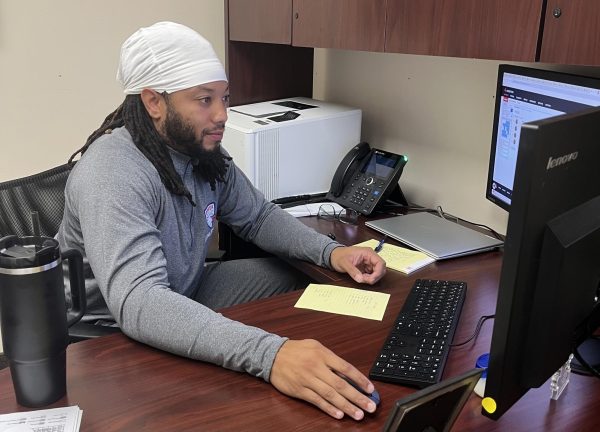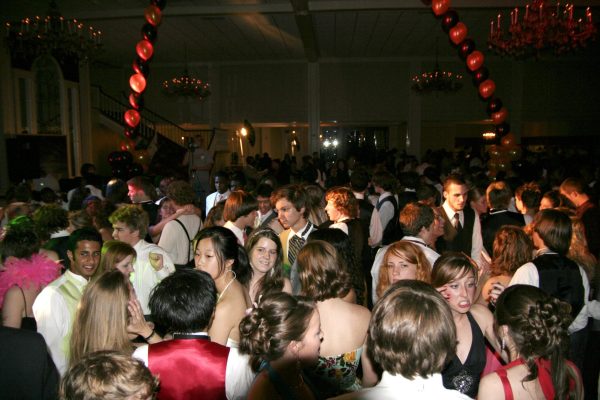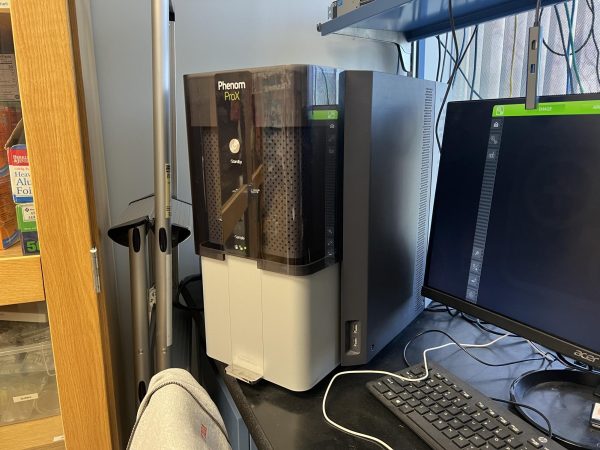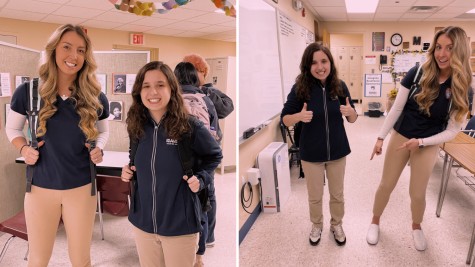The conflict in Ukraine is all too real for AMSA math teachers
Q&A with Luba Shmidt and Anna Makovoz
Luba Shmidt’s son, Mark Kagan (left), attended a rally in support of Ukraine in Boston last month.
The conflict between Ukraine and Russia is more than 4,000 miles away, beyond an ocean and across the vastness of a continent. When people are not forced to deal directly with difficult issues of humanity, they often simply turn a blind eye and focus on their own lives.
They don’t see, perhaps, that such issues affect the people they might interact with nearly every day. Lives on the planet are intertwined. There are people inside AMSA’s halls for whom Russia’s invasion of Ukraine is all too real. For them, this is not a movie or a moment to be recorded in a history book or a clip to be viewed on television or the internet.
Luba Shmidt, chair of AMSA’s math department, and AMSA math teacher Anna Makovoz grew up in Russia and Ukraine, respectively, and they saw the countries inside what was then the Soviet Union become sovereign entities after the end of the Cold War.
In a recent conversation, they discussed their feelings about the Russian invasion, what it means, and how the fighting has affected the lives of everyday people.
Tessa Donohue: How are you feeling right now about Russia advancing into Ukraine?
Anna Makovoz: We are stressed. We are stressed, we are upset, we are angry because never even in our nightmares could we have thought this would actually happen between Ukraine and Russia. Many years ago it was one big country, sort of a union, and people would move between the two, so many people from the same family live in Russia and many live in Ukraine. But nobody thought that there would be one day when these two countries would fight each other. Where some people will decide “okay, let’s take over this country,” while others will fight for their belonging, their families, and their land. For me it is altogether … I cannot explain my feelings. I am upset, I am angry, I am scared all in one.
Luba Shmidt: I agree, we are talking all the time and our feelings are the same — it is anger and frustration. We are scared but I believe that anger is probably the prevailing emotion, because what is happening is destroying both countries. Russia is an aggressor, but what is happening is destroying Russia as well. Russia is my own country, and I believe it is terrible. It is absolutely and 100 percent terrible. It cannot be just defined in any way. So when you hear any explanation for that, forget about it. Ms. Makovoz told you it was one country long ago, but we still have tons of people who have families in both countries — there are millions of people who have relatives in both countries. But of course, in the last eight years, there were serious problems between the two countries, but as I said, nothing can explain or justify what is happening now.
TD: You said you guys talk to each other about it. How has your day-to-day life changed? Do you talk about it? Does anybody here ask you about it?
LS: Of course, we try to answer questions as much as we can explain because, unfortunately, it is not so easy to explain all the details, because there are tons of details, as we have said. From why it is happening and why we have this madness. But we do, we try to talk to people and give them our perspectives. I am attached to my phone all the time, reading news all the time, and I am reading both Russian independent news and Ukrainian news. I have two Ukrainian channels and unfortunately in Russia, all independent news is shut down — which is another thing everyone needs to know. The Russian news sources I am reading are all located outside of Russia. Media inside Russia can’t tell the whole truth. In Russia, there is some resistance but it has been crushed. I have friends in Russia who are jailed/detained/etc. for that, so, it is not so easy to explain.
AM: I have friends whose son and husband in Kyiv are fighting for their land and their life. And actually, both sides are suffering. There are people from both sides suffering. Russians who came to fight for no reason, and Ukrainians who fight for their freedom. Both sides are just dying for no reason. This is what makes me so upset I cannot even say. I hope at some point … I can’t find words. I can’t find words in Russian, and I am a Russian speaker — I was born in Ukraine, I grew up in Ukraine but I am a Russian speaker. I don’t understand this conflict.
TD: Because this is such a personal and emotional subject for the both of you when people ask you questions are you frustrated by it? Do you wish they would do research on their own? Does it feel like a burden, or are you happy that you have this information for them?
LS: No, we are actually very happy to explain.
AM: We are happy to.
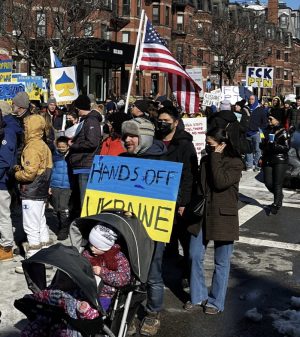
LS: We don’t feel frustrated about that; we are very happy to provide information because it is very hard to find information.
AM: The correct information, yes.
LS: We are much more informed than any of you because, like I said, I am reading two Ukrainian channels and many Russian channels — you cannot do that. You cannot, you only have English-speaking news.
AM: I read Israel news — I speak Hebrew. I speak Russian so I am reading some Russian news, and we have much more information. And if you have this information you need to share it; others need to understand what is going on. It isn’t a fight between two nations, it is something else.
LS: So no, we are not frustrated. Please come and please ask.
TD: Are you satisfied with the American news coverage?
LS: I read BBC news and CNN. I’d say that they are much less nuanced and detailed, and are actually a little bit behind in the timing. I know that things are happening very fast during wartime and as a journalist, you need to check your facts so it isn’t very possible to get the news out fast. But still, I am a little bit frustrated when I see things that happened two days ago actually being discussed as if it is happening now. Like, come on, in two days we are at a completely different point because of how fast everything is happening. Another 24 hours and everything changes.
AM: It isn’t correct or proper information really. I completely agree with Ms. Shmidt; everything she is saying is my thought as well, but I understand.
TD: Do you think the response of the U.S. population is accurate and reflects the importance of the situation? Or do they view it as an abstraction because of the distance between their own lives and the fighting?
LS: Yeah, I understand what you are asking. When I am driving to school I listen to NPR all the time and I am questioning why they are talking about this when they need to be talking about that. It is a huge deal; it is the number one issue right now and people need to be talking about it. People need to understand this, as it is putting into question our entire existence. Another thing when we are talking about if people are seeing it accurately — I am afraid of people in America beginning to look at Russians as enemies. People need to understand that the majority of Russians living here left Russia because they couldn’t live under that government. Many Russians right now are hostages of this regime. They are 100 percent of the opposite opinion to what is happening in Russia, and they are trying to collect some money or goods for Ukraine. I have friends who are doing that as well as going to rallies for Ukraine. The majority of Russians here feel more for Ukraine than Russia right now.
AM: They are humans. Okay, they are humans; they just feel bad for people who are dying for no reason. And they are trying to help. It doesn’t matter where you are from, it is not a fight between two nations — it is a fight of one person who I’m sorry is —
LS: Insane?
AM: Yes, one person who thinks as though he is God. Of course, it isn’t only one person, but, pretty much. Sometimes I have the feeling that — not people at school or around me because everyone here asks me how I am doing, how is my family, how I am dealing — but in the everyday life of others, Ukraine is seen as some country far away from the United States where something is happening. It looks like it is far away, but nobody knows how this huge fight between these two countries can change the lives of everybody. Not only in the United States or Europe but everywhere around the world. I think it is really serious and we need to know what is going on.
LS: We don’t want to scare anybody, but it is scary. It is a huge issue.
AM: I wish it could at some point just end. It is a fight between Ukraine and Russia and someday it will be stopped but …
LS: It has not yet.
TD: Was it frustrating to watch people push the rising tensions aside, and instead focus on the Olympics or other issues within our own country, and caring only when it got to such a boiling point?
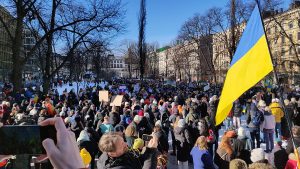
LS: Yeah, that’s true. I’d say that prior to the conflict, there were of course a lot of worries about what was happening. This military rhetoric and collecting war forces around Ukraine, I believe it was covered, but … the thing is it didn’t just start now. I actually told somebody that if [Russian President Vladimir] Putin had been stopped in 2014 this situation would not have happened. And unfortunately, you are right that the majority of countries, and America is not an exception, they worry and they care much more about what is happening within their borders. They tend to ignore what is happening in other parts of the world. In our current world, all parts of the world are connected. Of course, we wish that something could be preventable, and it might be preventable if we paid attention to what is happening.
AM: I agree with Ms. Shmidt about 2014. If it had not happened with Crimea — we cannot be sure, but most likely — it would not have happened now.
TD: How often are you both in contact with your friends and family in Ukraine or Russia?
LS: At this point, I’d say almost every hour.
AM: For me, I am trying not to call Ukraine because I don’t know what the situation is and I don’t want to be the reason for them to have to deal with more pain than they already have. Sometimes when they are already in pain and you try to talk about the pain it just makes it even worse. I just wait for news when they will send it to me. I am not trying to dig and ask for what is going on, just for my curiosity. I care about them but at the same time … I cannot help so I will wait.
LS: I have friends, like I said, who are participating in anti-war rallies in Russia where they can be detained for 15 years in prison [if arrested]. So I am checking every day — are they home, are they safe, or has something else happened to them. I am checking on them pretty regularly because they are all pretty active.
TD: How has the contact changed?
AM: Whenever you call and you talk like it was just yesterday. It could be once a month, or it could be every day that you have free time, but every time we talk like it was yesterday. With some friends I am talking much more, with others less, but just when I want to talk I talk. With the difference of time for me though it is a little bit hard. Now definitely I know what is going around because I have many different ways. My sister communicates with friends from a different part of Ukraine not far from my own friend, and we all have different information.
LS: I usually would communicate with my friends once a week to once a month and right now it is every day.
TD: I feel like I always forget about time zones — I hadn’t even considered that till you mentioned it.
LS: Exactly. That’s why we used to only talk on Saturday or Sunday, but now I am calling on my way home, when I am in my car. And they don’t sleep late because of the whole situation; it is 1 or 2 in the morning but they’re still up, so we can talk.
TD: The fact that they’re still awake is almost a testament to the effect this whole situation is having on people who are dealing with it first hand.
LS: Yes, and they are awake because they are worried, but Ms. Makovoz’s friends cannot sleep because there are missiles around.
TD: What is something you wish people could do to help themselves understand the situation better to avoid any apathy or lack of understanding of what is going on?
LS: I would say to have as many resources as possible and to not forget this is happening. I believe we cannot afford to forget this is happening. We cannot.
AM: Sometimes you have a feeling when it is happening just a week ago, people think “Wow this is really happening,” but when it gets to two weeks or three weeks, people tend to get tired of it. But there are so many people dying right now. From both sides for no reason. People need to know that nobody is safe now, because everything is so close together that something must be done. I don’t know what must be done, because I don’t have a solution for this. But we need to help somehow. They don’t have anything right now — they don’t have food, medication, or anything. It is scary. It doesn’t matter how many times I jump or cry or what I will tell others it is not going to help anymore. Do people need to be informed? Yes. Do they need to know what is going on? Yes. I can’t find the words. There must be some sympathy and they must understand: It is not a fight between nations; both nations are suffering right now. I don’t know how to help. It is not in our hands. If we could just clap now and everything would stop, and nobody would be fighting … it would be magic. But obviously, we cannot.
LS: I feel that my only hope if this ends in some near future — say a miracle would happen — my hope is actually in the younger generation if we don’t want this situation to continue. It is scary and this situation is actually pretty unique, but at the same time, if nothing will be done after this ends, it may eventually continue. Maybe not with Russia and Ukraine, but in some other part of the world. So like I said the world is connected now, in a bad and good way. I really hope that the new generation will find some way to … I don’t know … create some system or something to prevent these things from happening. Maybe I am an idealist, maybe I have my rose glasses on, but I do have this hope. I do believe that young people can do this. So yeah, we failed, but we hope you will not fail. There is a possibility. You need to be informed.
AM: You must be informed; you must know what is going on here. It is really important.
LS: And you need to have a clear mind, and do not go into unjust hatred.
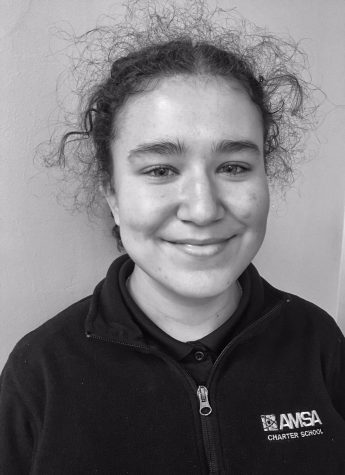
Tessa is a senior, excited to write for The AMSA Voice for a second year. She has been at AMSA since the 6th grade and is a member of student government,...


